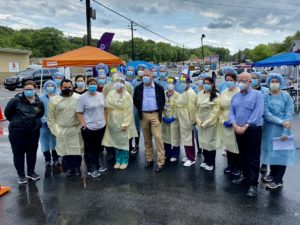Community Partnerships
Category : PROspective
Building partnerships is a skill set that is critical in public health and yet not commonly taught directly. I do not recall ever taking a class that specifically discussed relationship building in graduate school, but now so much of my work and work in the community is based on partnerships. What I do remember is how people dreaded group projects and how students still are not always thrilled when they are presented in class as the next assignment. So why is that? Perhaps it is more efficient to do assignments alone. For that reason, solo work can be great, but for me, the most fulfilling work I have done since graduate school has involved collaboration and connections.
For the past two months, I have been fortunate to be part of a team working on the COVID-19 response in Hall County, a community hard hit by the pandemic. The outbreak in Hall County is centered in the Hispanic community, where close community living and tight working space in factories make social distancing hard. The interesting thing about leading the outbreak response from Emory’s side is that before this partnership, I had no connections to Hall County. Nevertheless, I was able to build this partnership based on previous work in similar communities and a shared common goal: We want to change the course of the COVID-19 epidemic in a hard-hit community that already was struggling with generations of disparities and inequities.
From training to impact. Our Outbreak Response Team began work today with a #COVID19 testing event at a poultry plant in Hall County. So proud to work with this group from @EmoryEPI @EmoryRollins. #PublicHealthinAction@lisa_chung @GarlowNellie @zoeschneider112 and gang pic.twitter.com/gesiMRZ7Ue
— Jodie L. Guest (@Jlguest) May 14, 2020
https://platform.twitter.com/widgets.js
This partnership began with a phone call from a leader in Hall County asking for help with their outbreak response. Not all partnerships begin with a specific request but most are built from some level of need, even if it is for a shared greater good. That first contact should promote open dialogue and explore opportunities of engagement. Allow yourself to imagine a collaboration that doesn’t yet exist. For Hall County, the request was wide open; they sought any kind of support and connection. After listening, doing some research, and setting some overarching goals, our partnership took off and has led to a commitment to working together and building a system of support for a community in need that did not exist before. Even with the acceleration of an outbreak, building this kind of community partnership calls for a few essential building blocks: connection, engagement, and communication.
Build relationships
The best partnerships are sustained by committed relationships. While this is always the important first step, pandemics do not allow for a long ramp of getting to know each other. However, a shared vision of making lives better can quickly set your connection. But even with common goals, a strong, lasting relationship won’t form without actively working on the continuous process of connecting.
Show up and listen
Much of our work in Hall County has been about listening to the need rather than expecting we know what it is. While there are some obvious needs we could anticipate, like the need to reinforce prevention messages, provide COVID-19 testing and tracing, and isolation when needed in high-risk communities, there are nuances to those needs we would not have known if we did not get into the community and talk with its members. We would not have guessed that solid prevention messages, appropriately translated, would still not be hitting their mark because of a lack of literacy that requires messages to be less than five written words. We found that concerns about immigration make options for quarantine incredibly complex. Interventions, even those with the best designs, will likely fail without a dedication to the nuances inherent to that community.
Communicate regularly and with intention
Sharing feedback builds trust and helps us learn and become better leaders and partners. This is a way of keeping communication open so that when problems arise, you can approach the solution together. Especially in a time of fast-paced engagement, be open to quick and varying methods of communication but do not move so fast that you are not consistently communicating.
The last critical component for partnerships is the belief that together we can increase our impact. I have no doubt that the best collaborations create something bigger than what could have been done individually. There has been a lot of trauma in our world this Spring, but there have been some amazing moments to celebrate as well. Collective cooperation working towards a common goal and an energy around building partnerships is certainly a win. We are better together.

1 Comment
Heather Zesiger
May 22, 2020 at 11:50 amThis is an excellent post! Thank you Dr. Guest. I hope some day we will offer a course in community-building and community organizing as public health. These are skills our students often learn through practice in REAL, APE and in our Scholars in Action and Rollins LEAD programming, among others. Students can contact me in Student Services to learn more. heather [dot] zesiger [at] emory [dot] edu